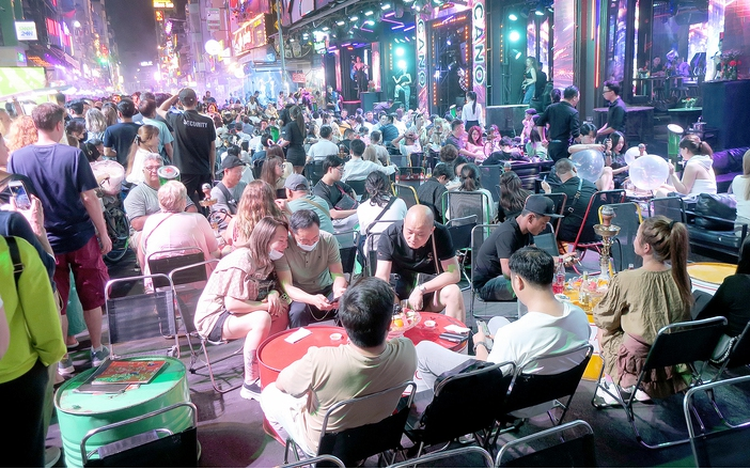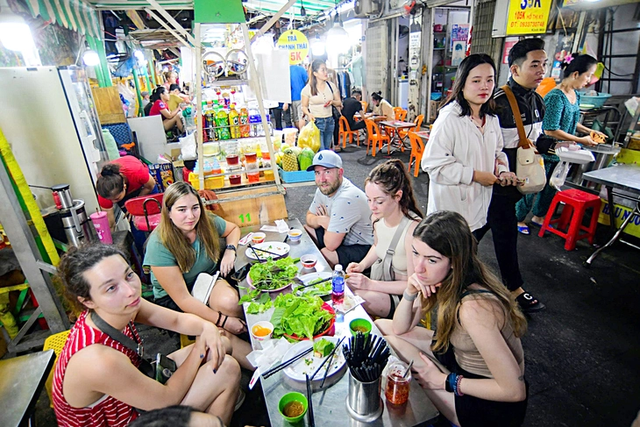
Bui Vien Street is a lively nightlife spot in Ho Chi Minh City. Photo: T.T.D. / Tuoi Tre
Ho Chi Minh City's night-time economy is booming with over 5,680 businesses and households operating in central wards such as Ben Thanh, Saigon, Cau Ong Lanh, and Tan Dinh. However, the tax management of this sector is facing challenges.
Vietnam eliminated the district-level administrative unit nationwide starting July 1 and restructured local administrations into a two-tiered system, including provinces/cities and wards/communes.
Night-time businesses are primarily concentrated in key streets like Nguyen Hue, Bui Vien, Ly Tu Trong, De Tham, Pham Ngu Lao, Le Thanh Ton, and Thai Van Lung.
The activities of shopping, entertainment, and dining become vibrant on these streets at night.
On Bui Vien Street in Ben Thanh Ward, music starts to play at 4:00 pm, and the lights at restaurants, bars, and pubs along both sides of the street shine brightly.
Many young people flock here for dinner, live music, massage, and late-night snacks around 2:00-3:00 am.
Ho Thanh Long, the owner of a restaurant and lodging facility on Bui Vien Street, said that the facility sees the highest customer volume during the weekends and it is always fully booked.
“Nightlife is a promising sector, and I am considering expanding my space to accommodate more guests,” he said.
Meanwhile, tourists to the city are also showing a preference for staying in central wards like Ben Thanh, Tan Dinh, and Saigon due to the convenience of transportation and the rich variety of night services.
Hotels and restaurants on Nguyen Hue Pedestrian Street stay open until midnight, offering Western cuisine, cocktails, and imported beer.
A representative from one of the hotels here stated, “About 70-80 percent of our revenue from food and beverages comes after 5:00 pm.”
Nguyen Mai, the manager of a French restaurant on Thai Van Lung Street in Saigon Ward, noted that since the 50th anniversary of Vietnam's reunification on April 30, the number of customers dining at high-end restaurants at night has increased by 20-30 percent.
These establishments have had to hire additional staff after 6:00 pm to meet the growing demand.
“Not only international tourists but also a significant number of domestic customers have an increasing demand for late-night dining and food experiences,” she said.
According to Bui Quang Trung, a local tax official, there are 5,680 taxpayers involved in the night economy in the four central wards, including 3,550 businesses and 2,130 households, making up 13 and 26 percent, respectively, of the total number of local taxpayers.

Bui Vien Walking Street in Ben Thanh Ward, Ho Chi Minh City attracts a large number of visitors, especially foreign tourists, to enjoy entertainment, nightlife, and culinary experiences at night. Photo: Quang Dinh / Tuoi Tre
A survey by the Ho Chi Minh City Institute for Development Studies, conducted to draft a proposal for developing the night-time economy in central wards like Saigon, Tan Dinh, Ben Thanh, and Cau Ong Lanh, revealed that 40 percent of the businesses polled earn over 50 percent of their total daily revenue from night-time activities, primarily in restaurants, bars, gyms, and 24-hour convenience stores.
The busiest hours are from 8:00 pm to 10:00 pm daily.
With the rapid development of the night-time economy, the Ho Chi Minh City Tax Department is intensifying its efforts to prevent tax losses.
Trung mentioned that the department has reviewed and established a tax management database for businesses involved in the night-time economy, alongside efforts to crack down on tax evasion.
The department has also developed a special inspection plan targeting 280 businesses, recovering over VND11 billion (US$421,056) in taxes and penalties, reducing losses by VND112 billion ($4.3 million), and cutting VND2.8 billion ($107,178) in tax deductions.
In the first half of 2025, the total tax revenue from businesses increased by 13.6 percent compared to the same period in 2024.
A total of 2,816 businesses and 250 households involved in the night-time economy have registered to use electronic invoices.
Challenges in tax collection
Despite these efforts, the tax department still faces significant challenges in ensuring accurate tax filings.
Many businesses set up branches in central wards but declare taxes elsewhere, complicating local management.
Large chains, such as Lavender Hotel, Sushi Tei, and Dynasty House, declare taxes at their parent companies even though they have hundreds of locations in downtown Ho Chi Minh City.
Some individuals and organizations set up two businesses at the same address to avoid tax obligations.
When being checked, some businesses temporarily close or dissolve, only to reopen under new legal entities.

Ho Thi Ky night market in Ho Chi Minh City attracts a large number of visitors. Photo: Quang Dinh / Tuoi Tre
Furthermore, many businesses in regulated sectors, such as massage or karaoke, which should pay the special consumption tax, register as spa, skincare, or simple dining services in their business licenses to evade tax obligations.
Some even use social media to exert public pressure, making it harder for tax officers working out of regular hours.
Also, some tax officials avoid confrontation, which affects the effectiveness of tax enforcement, according to Trung, the tax official.
Preventing tax evasion
To address these issues, the local taxman called on the Ministry of Finance to implement post-inspection measures for business licensing, aiming to prevent individuals from exploiting loopholes to establish multiple legal entities or household businesses at the same address to evade taxes, engage in invoice trading, and cause budget losses.
It also recommended adjustments to tax management decentralization, allowing businesses in sectors like restaurants, hotels, high-end services, and night-time activities to file and pay taxes at their actual business locations.
This would strengthen tax management and prevent branches in central wards from declaring taxes at headquarters in other regions, which has been a major loophole leading to tax losses.
Three specialized tax teams have been established to enhance management over the night-time economy, ensuring all registered businesses are under tax supervision.
Unauthorized closures and tax evasion will be dealt with strictly.
Task forces have been formed to review taxpayers based on their location, and provide a map for management.
They will make sure that businesses create electronic invoices from cash registers and cross-check all transaction data against revenue declarations.
According to a survey by the Ho Chi Minh City Institute for Development Studies, international tourists prefer food-related activities in the evening, with over 86 percent opting for restaurants, 62 percent visiting pubs or bars, and 44 percent choosing cafés.
On average, each international tourist spends around $50 on night-time activities.
Nearly 83 percent of the businesses surveyed plan to continue their night-time operations over the next three years, with more than 61 percent wanting to broaden their services.


Max: 1500 characters
There are no comments yet. Be the first to comment.